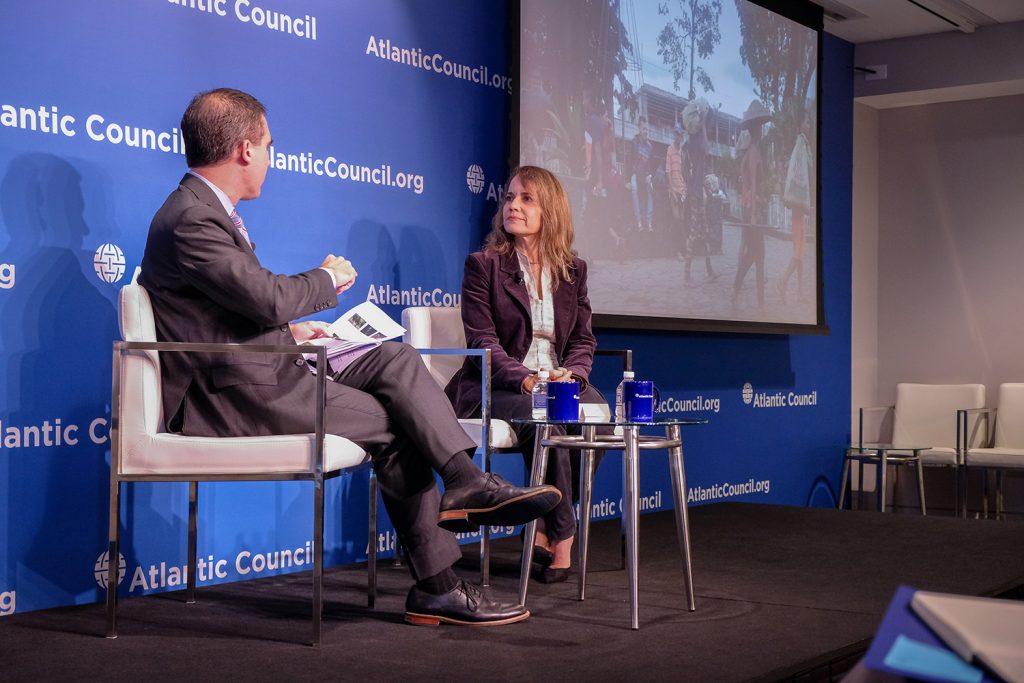En español
On December 10, 2019, the Atlantic Council’s Adrienne Arsht Latin America Center, in partnership with NTN24, hosted a timely panel on illegal mining in Venezuela and its implications in perpetuating the ongoing political crisis.
The event opened with a slide show of the environmental damage and destitute living conditions for miners of the Orinoco Mining Arc, an area of over one hundred thousand square kilometers south of the Orinoco River set aside in 2016 by Nicolás Maduro as a “strategic development zone” for extracting gold and forty other minerals. Lisseth Boon, an investigative reporter for RunRun.es, guided the slideshow with her insights gained after years of reporting on the region. The mining has been driven by “the terrible economic crisis that exists in Venezuela,” she illustrated. “There has been a displacement of people going to the Orinoco Mining Arc to work in the mines, in deplorable conditions, almost in a situation of semi-slavery. Here they are exposed to all kinds of illnesses, such as malaria, [and] in contact with mercury… [It is] a situation of exploitation.”
The remaining panelists entered the stage and the panel shifted to a discussion on comparative approaches to illegal mining moderated by NTN24’s Washington correspondent, Emiliana Molina. Sasha Lezhnev, deputy director of policy for the Enough Project, laid out what he saw as the three main responses to the conflict minerals trade in the Democratic Republic of Congo: the United States passing legislation requiring US companies to report minerals purchases, private companies setting up auditing systems for mineral supply chains, and regional governments implementing a certification process for the minerals. The new regulations have had significant impact on illegal operations, Lezhnev concluded, “almost 80% of miners [are] no longer working at conflict mines.”

The situation in the Democratic Republic of the Congo and Orinoco, Venezuela, show how “illicit trade networks in both countries bring together the worst elements of the criminal economies. You have child labor, prostitution, slavery, and massive environmental degradation,” said Douglas Farah, president of IBI Consulting. “The profits then go to the worst elements of the regimes,” he added, alluding to Maduro, Nicaraguan Presdient Daniel Ortega, and Surinam’s President Dési Bouterse.
In neighboring Colombia, armed groups see mining as a lower-risk alternative to drug trafficking. The National Liberation Army (ELN), and Revolutionary Armed Forces of Colombia (FARC) have penetrated deep into the Venezuela to take advantage of the available resources. “The involvement of the armed groups in mineral activities was born out of a window of opportunity… It was less risky, with higher benefits…Obviously, there are risks of dispersion, meaning a ‘balloon effect,’ if one puts pressure on one side, there is the risk of dispersing or pushing this activity into other regions or into Colombia or into Venezuela,” said Frédéric Massé, co-director of Red CORAL.
The Orinoco Mining Arc itself is “an extensive criminal network,” that reaches various foreign destinations according to Boon. Although the government initially established the Arc to regulate mining activities, however, now “the Nicolás Maduro government has taken refuge in gold to maintain itself… The central bank formalizes the gold and sells it to businesses and businessmen in other countries,” she explained. “This is gold that leaves in official aircraft going to Turkey, to Russia, to the United Arab Emirates, to Uganda… to Switzerland, and to England as well, it is suspected,” added Massé. From these markets, the illegally mined metal can reach western countries in electronics and automotive parts. “[Companies] should start to commit to sourcing only from gold refineries that have gone through conflict-free refineries… In terms of government response, sanctions are very important here,” Lezhnev suggested.
The discussion closed with the participants’ thoughts on the future of the Orinoco Mining Arc. “The biggest risk… is that the connection between money laundering, drug trafficking, and the mining sector will be even bigger in a country like Venezuela,” said Massé. The panel agreed that the international community ought to take action to help address the issue. “I believe it is important for international norms to identify Venezuelan gold as ‘dirty gold,’ or as a conflict mineral,” Boon argued. “The United States and Europe can do a lot more to crack down on the flow of gold out of Venezuela… The neighboring countries—particularly Brazil, Guyana, and Colombia—have to be much more serious about controlling their borders,” added Farah. And “there need to be consequences for those who continue to trade in the gold and are engaging in this illicit behavior,” concluded Lezhnev.
A conversation with
Lisseth Boon
Investigative Reporter
RunRun.es
Sasha Lezhnev
Deputy Director of Policy
The Enough Project
Frédéric Massé
Co-Director
Red de Monitoreo del Crimen Organizado en América Latina
Douglas Farah
President
IBI Consultants
Moderated by
Emiliana Molina
Washington Political Correspondent
NTN24
Welcome remarks by
Jason Marczak
Director, Adrienne Arsht Latin America Center
Atlantic Council
This event is being held in collaboration with
